Topics:
Marketing StrategySubscribe now and get the latest podcast releases delivered straight to your inbox.
 Most marketers know the phrase “too many cooks in the kitchen” all too well. If not, tell me the following scenario doesn’t sound familiar:
Most marketers know the phrase “too many cooks in the kitchen” all too well. If not, tell me the following scenario doesn’t sound familiar:
You’ve just been assigned to lead a new marketing initiative. Soon after, word gets out around the office about it and before you know it, everyone there is all of a sudden a marketing and design guru with expert advice for you. Been there, done that, right?
Unfortunately, certain CEOs and executives don’t always appreciate the value of a top tier redesign. They’ll often have “critiques” of the work being presented or the necessity of the project as a whole.To earn your boss’ support and ultimately “sell” the importance of a redesign project, the key is to get them invested from day one.
So as a marketer, what can you do? Here are 5 things you can do to get your boss on board with your next project.
1. Establish the Goal:
Starting with the goal is the only way to ensure that everyone is on the same page from the get-go.
Sit down with all stakeholders, discuss, and record what the goal of the project is, the reason for the redesign, and what exactly is being redesigned (website, logo, branding,etc.) Will it increase conversions? Traffic? Whatever the bottom line results may be, use these to make your case. Also, make sure to have a creative brief process ready.
2. Have a Dedicated Team:
During a redesign, there are sure to be a bunch of moving parts and contributing parties involved.
Your team structure might look like this:
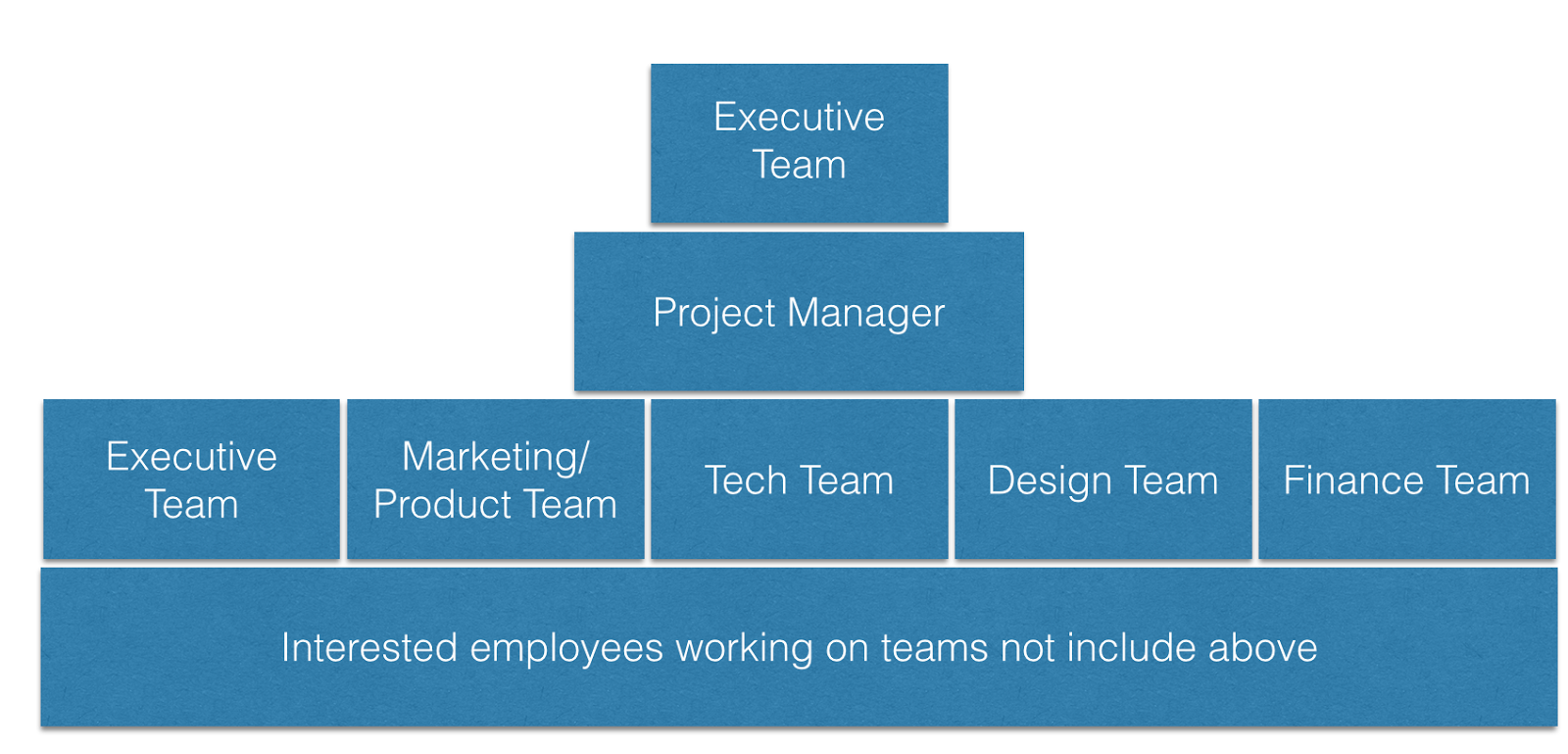
But let’s be real, the last thing your boss will want to see is your entire company stopping to work on one project.
Note that in the structure above you’re managing both up and across to the executive team.
While they control the budgets, they should also be a part of the ongoing conversation with the rest of the team (time permitting.) This kind of transparency and strategic organization will help keep you and your boss on the same page at all times.
At the same time, however, you want to avoid having too many opinions on your project.
The best way to avoid confusion is to publicly assign pieces of your redesign to specific people (tools like Google Docs and Trello can help.)
As you build out your project management template, be sure to always have an owner for everything so that someone has responsibility. For instance, you’ll most likely need someone taking care of your:
-
Competitive/industry overview
-
Branding goal of the new site (tone, colors, font, etc.)
-
Current design trends by device
-
Site functionality and integrations
-
Site imagery and content
-
Project management and communication
3. Confirm the Budget:
Confirming your budget is one of the biggest reasons designs succeed or fail. For instance, if you don’t confirm a budget right from the start, your team may start to look at designs and capabilities that are out of your agreed upon price range.
If you define a budget first, say $10,000 or $25,000 or $50,000+, this sets parameters for your team during their research and ensures that all proposals are already pre-approved from a budgeting standpoint (a big win.)
If you don’t feel like your budget is substantial enough to pay for a worthwhile redesign, SPEAK UP.
You don’t have to redesign. If spending $10,000 isn’t going to be enough to meet your goal as a company, then maybe that cash could be spent better elsewhere.
Write out a wish list for your boss and show her/him all of the capabilities that your budget can and cannot pay for, and then have the conversation about what is being sacrificed.
By bringing your boss the research, data, and budget estimates for things that are outside of your budget, you’ll be in the best position to be taken seriously in trying to secure additional budget if needed.
4. Set a Timeline and Stick to It:
For the majority of companies, you can redesign your website in as little as 8-12 weeks. (It may seem like a fast timeline, but I’ve been a part of multiple redesigns that fit into that timeframe.)
While the amount of time it takes to redesign is important, confirming launch dates and deadlines with your boss is infinitely more important.
These dates are essential to staying on track to achieve your goals -- and let’s face it, at the end of the day, that’s what matters most to executives.
The problems most teams face are that deadlines are missed, capabilities that were promised are overlooked, or invoices are coming in for more than what was budgeted for, but in the past, as long as I was upfront about dates and any changes in our timeline, my boss was always supportive.
Something to keep in mind during a website redesign is to “over-communicate.” You might “annoy” a few people for a month or two, but it’s worth launching a perfect redesign and keeping your boss’ support.
Here is a great example of a simple timeline from CrazyEgg:
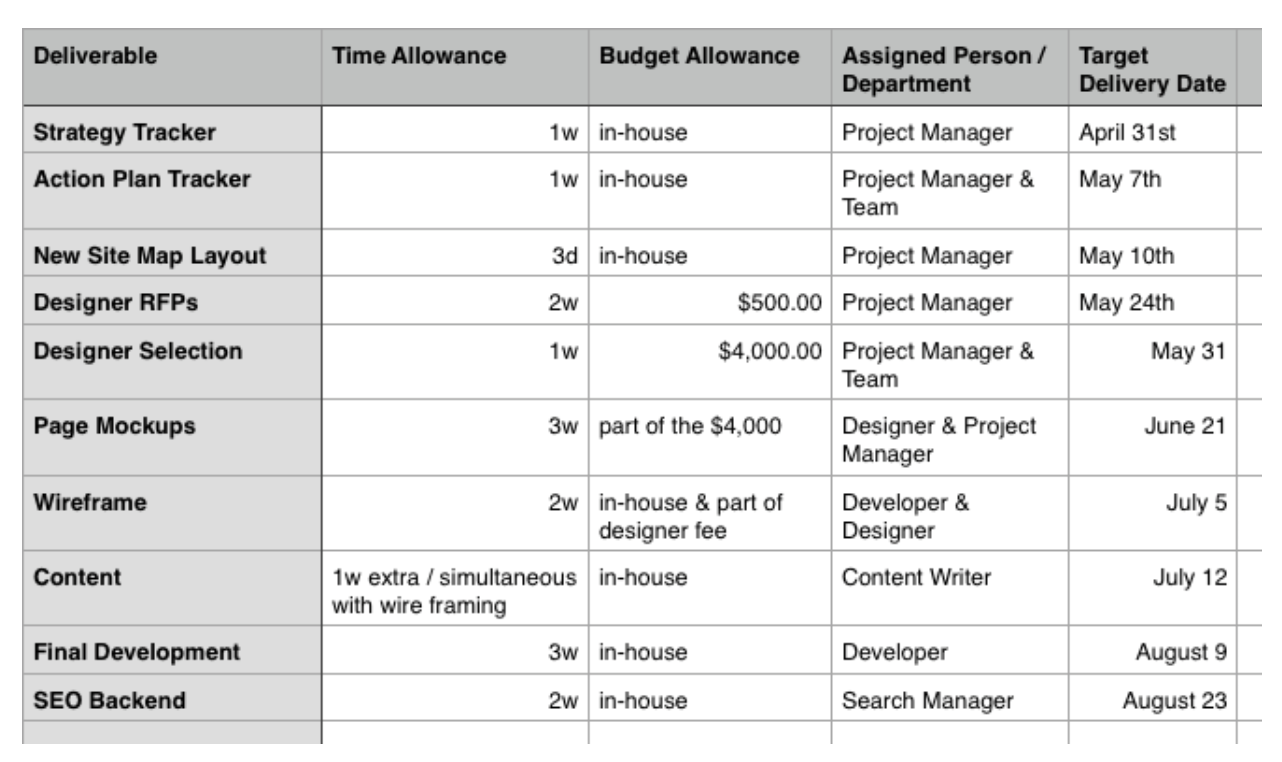
5. Make Everyone Involved Have a Voice:
Notice I didn’t say “let” everyone have a voice. All too often, people just throw in ideas to a design project so that they can be involved, but these suggestions are often empty or redundant.
Make people work a little if they want to have a voice; it’s the best way to ensure they're legitimately committed and invested in the redesign.
For instance, showing visual examples of sites or design elements that you like is the best way to show designers the direction/tone you want for your site. Using a site like Crayon is a great way to get people involved easily and at no cost.
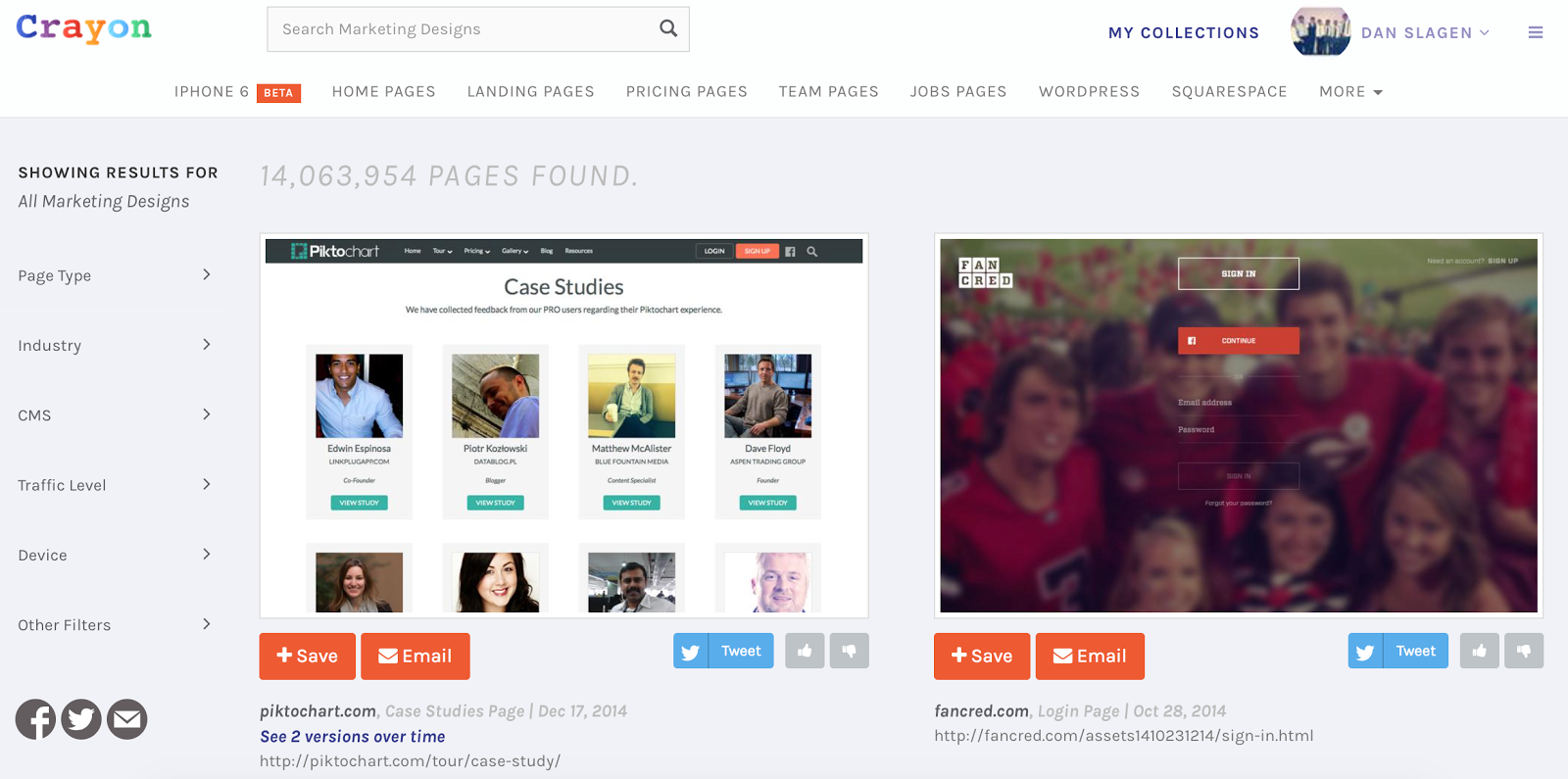
Let’s say you were redesigning your case study page for example. You could create a collection in Crayon of your favorite case study pages.

The next step would be to invite members of your team to the collection so that they can collaborate with you.
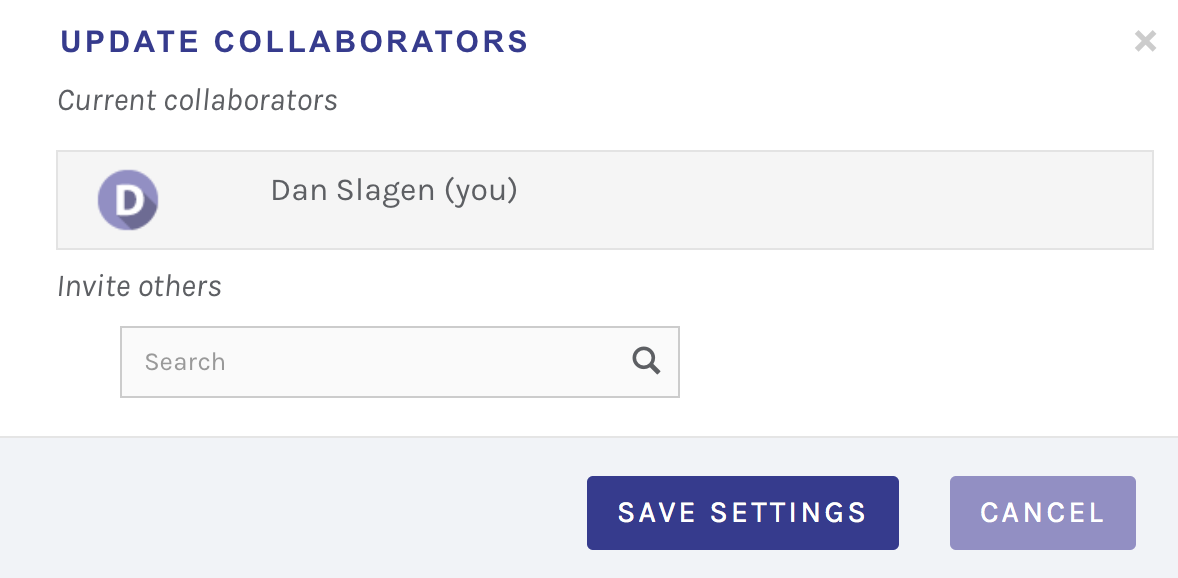
They’ll now have access to the designs you’ve selected and can also add new designs that they like to the collection.

As new designs are added, members of the team can add comments for you to have discussions about what is liked/disliked.
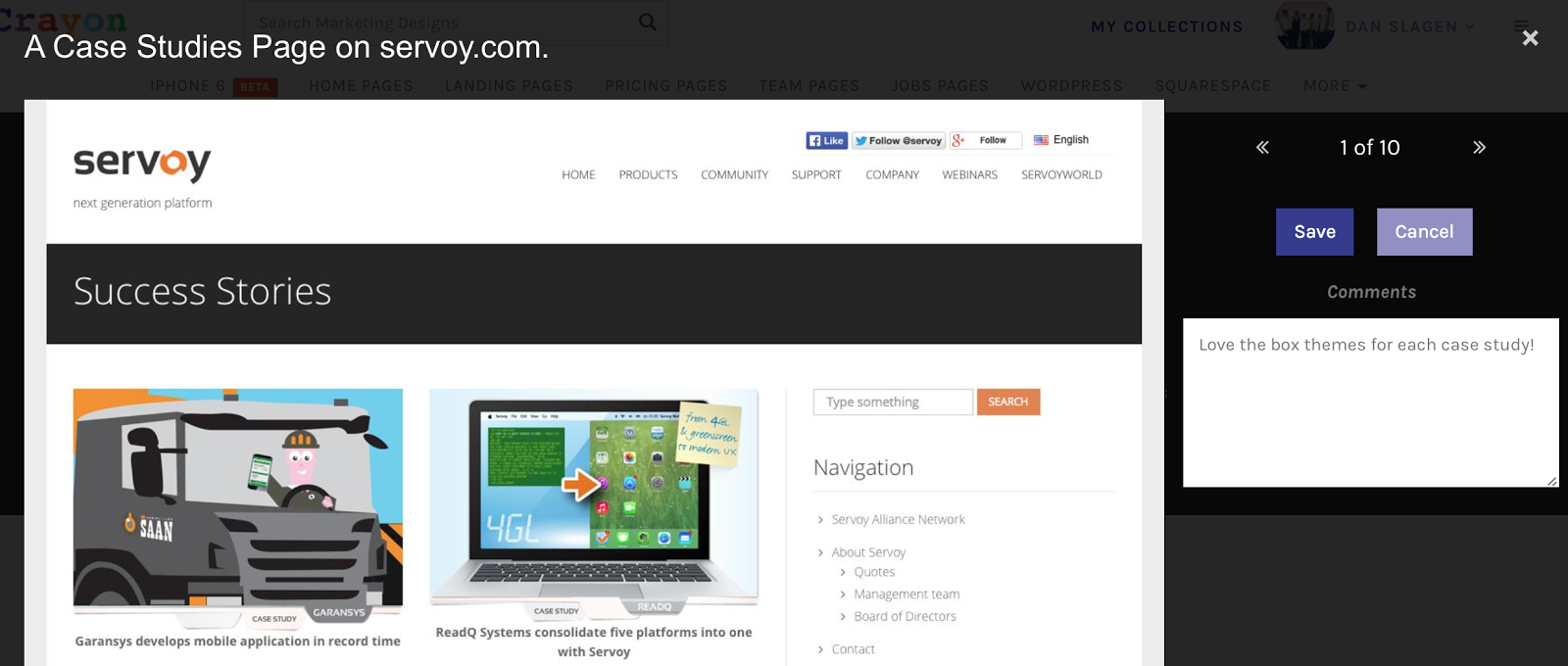
Designers can also chime in here on the comments to confirm design requests, ask questions, and/or offer ideas and suggestions.
Key Takeaway: Practice Your Process!
So remember:
-
Establish a goal
-
Assign
-
Confirm a budget
-
Set a timeline
-
Make everyone (who wants to be involved) have a voice
Redesign projects fail because of miscommunication and a lack of process. Even for those young start-ups that operate without a lot of processes, redesigns are just one of those things that will drive you crazy without a detailed and concise plan.
If you want to perfect your design process skills, start with smaller design projects. For instance, before you redesign your entire website, try starting with your team page or your pricing page.
Go through the same process you would for a larger project and see what works and what doesn’t. By doing this a few times, you'll be able to see where things go wrong within your company and what works in regards to securing budgets and approval.
Then, when it’s time for the BIG redesign, you’ll have your process perfected.
Crayon is an insights engine for marketers. It's the new way to get inspired and explore great ideas about what to build. Try it for free here!
Also, join me and the IMPACT team for this month's Website Throwdown, August 18th at 1:00pm. Submit your site to get torn apart here or by clicking the banner below. I'll see you then!
Free Assessment:

